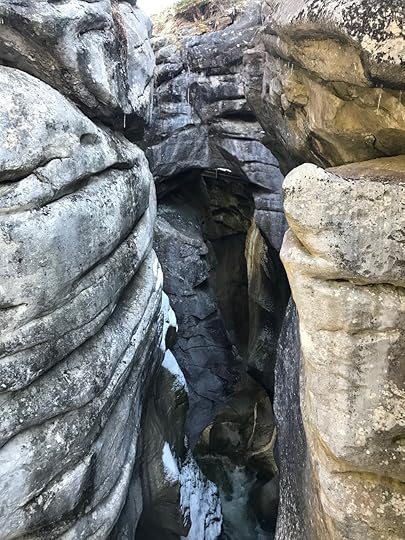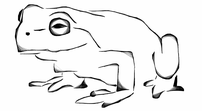Andrew Furst's Blog, page 18
April 8, 2018
Natural Bridge in North Adams MA

This weekend’s adventure to North Adams MA for some much needed R& R
The post Natural Bridge in North Adams MA written by Andrew Furst appeared on Andrew Furst.
The Best Articles of March 2018 from Andrew Furst
Here’s a selected list of what people were reading here on andrewfurst.net in March 2018:
Secular Buddhism – What’s Your Take? – Modern Koans
At What Point are We No Longer Human? – Modern Koans
Thoreau On The Narrow and Crooked Path
Faces – Tiny Drops (Photography)
Happy – Found Art
Stephen Hawking on Predestination
Carl Sagan on Delusions – Quotes
Channel This? – Say What?
The Sutra on Totality
Life in a Crowd – Found Art

 At Patreon you can make small monthly micro-contributions that help support my work.
At Patreon you can make small monthly micro-contributions that help support my work.  If Patreon doesn't work for you, then drop me a one time contribution at PayPal.me
If Patreon doesn't work for you, then drop me a one time contribution at PayPal.me
The post The Best Articles of March 2018 from Andrew Furst written by Andrew Furst appeared on Andrew Furst.
April 4, 2018
Does God Think? – Dialectic Two Step
Does God think? Does he need to?
Response:
If God experienced thoughts the way we do; as passing in and out of our awareness as an amalgamation of sensory perception and mental formations, that would it mean that God would require corporeal form.God would needs senses, and some mechanism to process the input. If he had corporeal form, would he be subject to change (all matter changes) and therefore imperfection? Oops.
This little exercise illustrates how anthropomorphizing God leads to absurdity. I firmly believe that the Bible, or any other theistic text, should ultimately be taken on metaphorically. If we open opportunities to look beyond the pedantic interpretations of religious literature, there is a richness of meaning that opens up to a deeper connection to the divine.
Don’t get caught up in the literal interpretations of these texts and avoid clinging to the image of God as a white guy with a snowy beard and a grandfatherly twinkle in his eye. Relating to God in this way is just not possible.
In fact, it is a useful exercise to explore everything we do not and cannot know about God. To me this has been the most enriching path.
If you enjoyed this post, please like and share.
Dialectic Two-Step is an ongoing series of my thoughts on questions that come my way.
Wisdom lies neither in fixity nor in change, but in the dialectic between the two. - Octavio
 Dialectic Two Step, Modern Koans, Verse Us, Say What?, and Minute Meditations all copyright Andrew Furst
Dialectic Two Step, Modern Koans, Verse Us, Say What?, and Minute Meditations all copyright Andrew Furst
Subscribe to My Newsletter Join me for a little peace through reflection, art, video, sound, and poetry
Join me for a little peace through reflection, art, video, sound, and poetry
The post Does God Think? – Dialectic Two Step written by Andrew Furst appeared on Andrew Furst.
Can We Prove Buddhism is Right? – Dialectic Two Step
Did you hear about the studies that show can actually improve ?
Response:
I’m always cautious when it comes to citing scientific studies to support a Buddhist world view or to practice. There are a few reasons:
I have an ongoing non-scientific study that shows that many studies attempting to prove religious practices work are followed on by even more studies debunking those claims.*
Religious practices are practices of the mind and their effects are on the mind. Because of this there is a tenuous link to objective truth.
Designing a study that could prove a religious practice is effective sounds impossible to me. In my opinion metaphysics is outside the bounds of the scientific method. I’ve said this many times – it’s not the right tool for the job. In general we can’t “prove” anything about religious belief, including Buddhist religious beliefs.
Not All Studies Are Equal?
One of the regulars at the meditation group I lead is a physicist and he often asks about what science has to say about Buddhism. We’ve talked about studies that show prayer helps healing, how chanting can make you healthier, and so on. I encourage people to follow the data when it comes to meditation and the Buddhist world view.
But when I talk about data in the context of meditation, it is always subjective. Here’s an example of what I mean. When a newcomer arrives for a meditation sitting, I always encourage them to do three things:
Notice how you feel before the practice
Notice how you feel during the practice
Notice how you feel after the practice
After the sitting, most people report a bumpy but consistent trend in a positive direction. They usually leave feeling better than the came. But this is a not a well designed study, and the results cannot be generalized to prove that Buddhism is good for everyone or that it is the “correct” religion.
Is It All In My Head?
Religions are belief systems or world views, so they live squarely in the arena of the mind. One important question we have to answer if we want to prove that a religion or a religious practice is “right” is this: Is the human mind capable of determining objective truth?
I’m going to approach that question by way of examining the functions and disposition of the mind. I’ll look at whether that disposition is compatible with the quest for truth with a capital T.
The “Me” Machine
What is the purpose of mind? I think that a good place to start is Maslow’s hierarchy of needs. Our minds are focused on the “me” or the “I”. We are the beneficiaries of all of its deliberations, intentions, and impulses. I’ve spelled out the needs hierarchy below with an analysis of how the mind is involved in meeting those needs. As we move up the hierarchy, you’ll note that the mind has more influence.
1. Biological and Physiological needs – Here the brain does the lion share of the work. It unconsciously coordinates billions of life sustaining functions. Breathing, heart beat, immune response, maintaining body temperature and acidity, and so on are all handled silently by the body. At a more advanced level, it coordinates hardwired behavior like shivering, hunger pangs, sex drive, etc. Of course the mind does play a role in these functions. For instance, we can strategize and make decisions on how to get warm or what to eat in response to what’s available and where we are. But at this level, the brain is in the driver seat.
2. Safety needs – Again the brain is in charge here. It controls most bodily functions that support our survival. Take the fight and flight instinct. It is produced by the release of hormones without any deliberation or intention. The body manages the complex muscle movements needed to run or fight. A mother’s instinct to protect a child is also hormonal. The mind supplements this hard wiring vis a vis allowing us to invent clever and flexible ways of meeting these needs. Consider informal and formal social contracts like friendships, marriage, and systems of government. We begin to see the mind playing a gradually more important role.
3. Love and Belongingness needs – The brain still plays a significant function here. Our biological need for connection is hardwired into the human condition out of the evolutionary necessity to reproduce. But a lot of this happens in our heads. We spend a lot of time and energy navigating our complex relationships.
4. Esteem needs – At this level, the brain still plays a role, but the mind is fundamental. Self-esteem is likely associated with sexual selection. But within that context, it remains highly conceptual and subjective. How we achieve it is dependent on how we and those we relate to define it. Esteem is achieved in a complex matrix of personal goals, relationships, and cultural norms.
5. Self-Actualization needs – The pinnacle of the hierarchy seems to be wholly in the mind. How this is related to survival and propagation of genes is an interesting question. Few if any other species on earth appear to be consciously engaged in self-actualization if only because it would require language to articulate the need and its fulfillment.
Is That All Mind Is?
So, mind is clearly about the individual. In this context it’s disposition is purely subjective. But the question I’m asking is about objective truth? Can the mind be effective in finding big T truth?
I think that the mind is capable of supporting the search for truth, but there are caveats and boundaries. We would expect the body and mind to be objectively accurate in determining threats and find resources. It does this very well, but there are two sides to that coin.
Our mind-body views the world in terms of threats and resources. A tiger is a threat and an apple is a resource. We know this as a fact, without much in the way of caveats or ambiguities. Generally the mind-body does a fantastic job of keeping us alive and safe. It does so through an accurate determination of threats and resources.
Our mind-body views the world in terms of threats and resources. Our body and minds operate through a strong filter of self-preservation. For instance, if there is a bug crawling on us, we instinctively swipe it off. But not all bugs warrant this response. A black ant is generally harmless. A deer tick could be a much bigger deal. A lot of our hard wired responses are “better safe than sorry” interpretations of the environment. Evolution can sometimes favor a cautious view of the world.
So there is usually a bias where the mind is concerned. I would add, that the more we rely on the mind, the bigger the bias.
Here is one way to look at it. If we plot Maslow’s needs on the spectra of mind-body and objective-subjective, the more the mind is involved, the more subjective, or biased, the outcome will be. For example, it is objectively true that a tiger is a threat. The fear that we feel when we meet a tiger in the jungle is objectively valuable. But if we adopt a world view of “it is what it is”, this self-actualization strategy may help us cope with things we can’t change, but it doesn’t mean that we can’t change anything.
[image error]
What Can We Say About The Mind and Religious Practice?
So now I want to make some statements about the mind that I believe are non-controversial.
The unconscious functions of the body are often overlapped and complimented by the mind
The functions of the mind provide novel supports for our biological, physiological, and safety needs. To put this more succinctly – the mind increases the odds of survival.
The functions of the mind have the most impact at the higher levels of Maslow’s hierarchy.
The higher levels of Maslow’s hierarchy are almost entirely subjective.
If you’re on board with these statements. I’m going to use them as premises for the following three conclusions:
The mind produces survival behavior, including the ability to function and compete in a complex society.
The mind is a survival adaptation – it’s primary function is to increase the likelihood that our genes are propagated
Because survival behavior is primarily self interested, the mind will have a bias towards self-preservation and self-esteem and away from objectivity.
Now, I want to make a few brief observations about meditation and religious practices in general.
Religious views and practices like meditation, act in the arena of the mind.
These practices enhance human experience at the higher levels of Maslow’s hierarchy
They are primarily relevant to the individual doing the practice. This makes generalization of the results difficult and tenuous at best.
Can Studies Prove Buddhism Right?
So, let’s reflect on the question that I posed in the title. Can science prove that Buddhism, or any other religion, is right? I’d have to say no. Because religions operate on belief. Belief is firmly in the realm of the mind and at the higher levels of Maslow’s hierarchy. Therefore it is subject to bias.
This doesn’t invalidate the needs or the practices. If you accept Maslow’s proposition, these needs are valid. If your needs are met with the practice, it is effective – for you. It just means they aren’t “right” for everyone. Knowing this can free you from a great deal of unnecessary suffering.
Religious truth claims are usually not warranted and can create problems. Truth is not necessarily applicable or necessary for a religious belief to fulfill a need. Asserting a religious practice or belief is objectively true is risky. If your self-esteem is heavily tied up in the truth of your religion, it’s going to get a little bruised.
* Mindfulness Based Stress Reduction is one notable exception.
If you enjoyed this post, please like and share.
Dialectic Two-Step is an ongoing series of my thoughts on questions that come my way.
Wisdom lies neither in fixity nor in change, but in the dialectic between the two. - Octavio
 Dialectic Two Step, Modern Koans, Verse Us, Say What?, and Minute Meditations all copyright Andrew Furst
Dialectic Two Step, Modern Koans, Verse Us, Say What?, and Minute Meditations all copyright Andrew Furst
Subscribe to My Newsletter Join me for a little peace through reflection, art, video, sound, and poetry
Join me for a little peace through reflection, art, video, sound, and poetry
The post Can We Prove Buddhism is Right? – Dialectic Two Step written by Andrew Furst appeared on Andrew Furst.
April 2, 2018
A Fool and a Happy One – Thoughts
Religions change and cease to exist. Rocks turn to dust. Ideas float and diffuse. We die, and with us our convictions. What is real is how we are in relationship with the world. Everything else is a dream.Andrew Furst
If you enjoyed this post, please like and share.
Quotes -The path to right view is an arduous walk through fields of manure.
Subscribe to My Newsletter Join me for a little peace through reflection, art, video, sound, and poetry
Join me for a little peace through reflection, art, video, sound, and poetry
The post A Fool and a Happy One – Thoughts written by Andrew Furst appeared on Andrew Furst.
March 29, 2018
Eradicating Delusion, Greed, and Anger – Modern Koans
What are the “Three Obstacles” in Buddhism, and how can they be eradicated?
Response:
So you want to eradicate delusion, greed, and anger. Seriously? Jeez. I guess you’re one of those go big or go home folks. Damn. Lets just say this; that, is a tall – no, gigantic – order. Do you mean to say that you’re really thinking you could transform the human race, subject to it’s endlessly varying circumstances and a genetic disposition towards the very problem you want to solve? Wow!
No really. Just wow!
That’s ambition. That is raw hubris. Do you realize the enormity and virtual impossibility of this task? I don’t wish to discourage you, but I do feel it’s important to step back and view the scope of the problem and appreciate the audacity of suggesting we might eradicate it.
Delusion
The Buddha offered a formula for the end of suffering; the end of delusion, greed, and anger. If we look at his offering, it’s nothing short of hyperbole. The Bodhisattva vow that many Mahayana Buddhist tale reflects this absurdity very clearly:
Living beings are innumerable: I vow to save them.
Delusive passions are inexhaustible: I vow to extinguish them.
The Dharma gates are immeasurable: I vow to master them.
The Way of the Buddha is unsurpassable: I vow to fulfill it.
Save all sentient beings! Really? Siddhartha Gautama left behind a small following of disciples. All of them are documented to suffer the obstructions – even after many years of learning under Lord Buddha himself. If he couldn’t save those closest to him, what hope would we have in saving the human race?
How’s That For Motivation
Discouraged? Surprised that a Buddhist would drop such a bomb on you? Good. Seeing – very clearly – the enormity and impossibility of the aspiration is very, very important.
Now I will say this: consider the alternative?
Consider a world where no one cared? Imagine a world where no one sought to alleviate the suffering that is born from delusion, greed, and anger. What a sad place it would be without the Buddha, or Jesus, or the unnamed many who made a difference. Imagine a world where no one took up the impossible task of making this world a better place?
So, if you’re up to taking on the challenge of eradicating the three obstacles (and I encourage you to do so), know that there is little guidance, no easy answers, and that your most trusted companion will be your inexhaustible propensity for failure. The only advice I can offer is to surrender yourself – completely – to it.
If you enjoyed this post, please like and share.
I'd love to hear your thoughts in the comments below.
Modern Koans is an ongoing series that recognizes that good questions are often more important than their answers.
The riddles of God are more satisfying than the solutions of man. ― G.K. Chesterton
 Dialectic Two Step, Modern Koans, Verse Us, Say What?, and Minute Meditations all copyright Andrew Furst
Dialectic Two Step, Modern Koans, Verse Us, Say What?, and Minute Meditations all copyright Andrew Furst
Subscribe to My Newsletter Join me for a little peace through reflection, art, video, sound, and poetry
Join me for a little peace through reflection, art, video, sound, and poetry
The post Eradicating Delusion, Greed, and Anger – Modern Koans written by Andrew Furst appeared on Andrew Furst.
March 20, 2018
Nesting in the Rain – A Two Minute Meditation
.
Composing mid-April lullabies
For her unborn nestlings,
A mother can make no other sense
Of this season.
Ancient designs of reeds and mud
Lie beneath her children,
Embraced safely in shell and albumin.
Purpose reveals itself, if only to breathe.
A Swan Nesting in the Rain on Crystal Pond in Peabody.
If you enjoyed this post, please like and share.
Minute Meditations is an ongoing series of short videos, poems, and commentary intended as a meditation. Offered as an opportunity to step back from your cyber routine and settle into a more natural rhythm, if only for a minute.
 Dialectic Two Step, Modern Koans, Verse Us, Say What?, and Minute Meditations all copyright Andrew Furst
Dialectic Two Step, Modern Koans, Verse Us, Say What?, and Minute Meditations all copyright Andrew Furst
Subscribe to My Newsletter Join me for a little peace through reflection, art, video, sound, and poetry
Join me for a little peace through reflection, art, video, sound, and poetry
These videos are produced for those of us who spend an inordinately large amount of time in the cyber-world. They are not a substitute for unplugging from your devices and taking a stroll near trees, water, or a patch of unkempt grass. Getting out into the world - touching, smelling, hearing, and seeing nature is the best way to reconnect with our prime purpose.
What is our prime purpose? We are feeling and sensing machines. We are the universe looking back on itself. We are witness to the wonders and dangers of living in this corner of the cosmos. We are the seekers looking for connection a little further beyond yesterday's borders and boundaries.
But sitting and staring at the screen robs us of the sustenance that we rely upon for wonder and sanity. These videos are an opportunity to bring the sensations of nature to you, while you're in the cyber-world. Its an opportunity to relax your gaze, resettle your posture, and regain some depth in your breath. Listen and watch the video and allow your self to open up and recharge.
The post Nesting in the Rain – A Two Minute Meditation written by Andrew Furst appeared on Andrew Furst.
March 18, 2018
“Taste” Accepted for Publication – Verse Us (Poems by Me)
After 106 submissions of 83 poems, I received my second acceptance letter. My poem “Taste” will be published in the Platform Review later this year! Perseverance pays off.
[image error]
If you enjoyed this post, please like and share.
Verse Us - Poems I write: haiku, senryu, mesostics, free verse, random word constructions, I might even use rhyme or meter once and a while.
 Dialectic Two Step, Modern Koans, Verse Us, Say What?, and Minute Meditations all copyright Andrew Furst
Dialectic Two Step, Modern Koans, Verse Us, Say What?, and Minute Meditations all copyright Andrew Furst
Subscribe to My Newsletter Join me for a little peace through reflection, art, video, sound, and poetry
Join me for a little peace through reflection, art, video, sound, and poetry
The post “Taste” Accepted for Publication – Verse Us (Poems by Me) written by Andrew Furst appeared on Andrew Furst.
March 14, 2018
Channel This? – Say What?
[image error]
If you enjoyed this post, please like and share.
Say What? is an ongoing series of laconic exchanges on Buddhism in the format of a comic strip.
 Dialectic Two Step, Modern Koans, Verse Us, Say What?, and Minute Meditations all copyright Andrew Furst
Dialectic Two Step, Modern Koans, Verse Us, Say What?, and Minute Meditations all copyright Andrew Furst
Subscribe to My Newsletter Join me for a little peace through reflection, art, video, sound, and poetry
Join me for a little peace through reflection, art, video, sound, and poetry
The post Channel This? – Say What? written by Andrew Furst appeared on Andrew Furst.
March 11, 2018
Art Frenzy -Shadowbox Series Available Now
I’ve had a fairly productive winter creating a shadowbox series. Patreon Supporters ($5 and above) can request one for free. Here is a selection of them, but take a look at my store to see all of the latest art frenzy creations.
The post Art Frenzy -Shadowbox Series Available Now written by Andrew Furst appeared on Andrew Furst.



